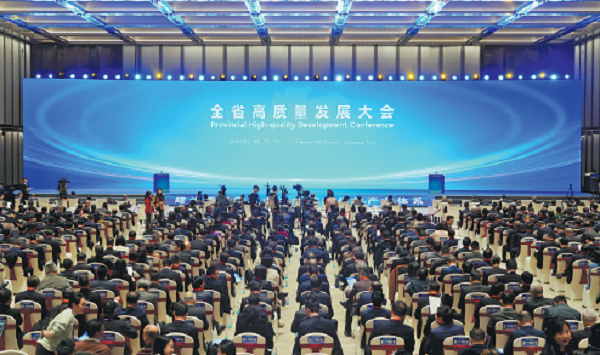Industrial transformation set to consolidate pioneering role

The Guangdong Provincial High-Quality Development Conference is held on Wednesday. DENG YINGHENG/FOR CHINA DAILY
Guangdong maps out path for high-quality development and modernization
South China's Guangdong province is poised to advance its industrial system, paving the way for a more globally competitive modern industrial framework, a senior official said.
"As the largest economic province in the country, Guangdong is shouldering the glorious mission of demonstrating the endless charm of the Chinese path to modernization," said Huang Kunming, a member of the Political Bureau of the Central Committee of the Communist Party of China.
Huang, who is also the Party secretary of Guangdong, made the remark at a provincial high-quality development conference on Wednesday in Guangzhou, the capital of Guangdong. Government officials, industry experts, and business representatives gathered at the event to exchange ideas and discuss issues on "building a modern industrial system".
Alongside the main conference, various parallel sessions delved into key topics such as the evolution of traditional industries, fostering strategic emerging and future industries, and accelerating the growth of financial and modern service industries.
According to Huang, building a modern industrial system is a strategy to grasp new trends in global industrial development. He said the province's industrial system has grown through opening-up and cooperation, and has become stronger via transformation and modernization.
Guangdong aims to spearhead technological revolution and industrial transformation, seizing the high value-added market space both domestically and internationally.
Over years of development, Guangdong has cultivated a robust foundation and distinctive advantages within its industrial landscape. The province has a comprehensive array of manufacturing categories, integrating traditional, emerging, and future industries.
The province has eight industrial clusters with annual industrial output valued at more than 1 trillion yuan ($137.16 billion) each. They include cutting-edge sectors like new-generation electronic information, green petrochemicals and automobiles.
In 2024, Guangdong achieved a record-breaking GDP exceeding 14 trillion yuan and a foreign trade volume surpassing 9 trillion yuan, with the latter constituting 20.8 percent of China's total. It was also home to 74,000 industrial enterprises above designated size and 77,000 high-tech companies, with the manufacturing scale accounting for one-eighth of the national total.
Moreover, the province's research and development expenditure was about 510 billion yuan in 2024, and its regional innovation capability has ranked first in the country for eight consecutive years.
Currently, Guangdong's production of new energy vehicles, industrial robots and smartphones accounts for about 25 percent, 50 percent and 40 percent of the national total, respectively. Also, the province's advancements in artificial intelligence and the low-altitude economy are notable, contributing significantly to the national landscape.
Wang Weizhong, governor of Guangdong, outlined a strategic road map for advancing basic industries and modernizing industry chains across all administrative levels in Guangdong. Emphasizing the importance of the real economy and manufacturing, he advocated the consolidation and enhancement of strategic industry clusters, along with the expansion of emerging sectors such as AI and robotics to drive new quality productive forces.
Furthermore, efforts should be made to promote mutual reinforcement between industry and science, boost technological breakthroughs, and build a globally influential industrial technology innovation hub, Wang said.
The regional industrial development layout should also be optimized, and the construction of the Guangdong-Hong Kong-Macao Greater Bay Area should be continuously advanced, he added.
Wang urged enterprises to expedite their progress toward the mid-to-high end of the industry chain, enhancing their core competitiveness. Meanwhile, government departments at all levels should treat all types of business entities equally, bolster policy support, and cultivate a top-tier business environment characterized by market orientation, legal compliance, and internationalization.
With its robust innovation ecosystem and strong economic foundation, Guangdong stands as a beacon of manufacturing excellence in China and on the global stage.
Yang Yinkai, deputy director of the Office of the Central Committee for Financial and Economic Affairs, underscored Guangdong's potential for profound transformation, driven by a combination of the real economy, comprehensive reforms, and openness.
The province is poised to embark on a comprehensive agenda encompassing the upgrading of traditional industries, the cultivation of strategic emerging clusters, the nurturing of future industries, and the optimization of the overall industrial ecosystem.
These efforts aim to accelerate the formation of a competitive modern industrial system, fostering sustained high-quality development and elevating Guangdong's economic prowess, he added.
Copyright © Foreign Affairs Office of Guangzhou Municipal Government,
Hong Kong and Macao Affairs Office of Guangzhou Municipal Government All rights reserved.
Presented by China Daily.
京ICP备13028878号-28



